Michelle Layer Rahal's Blog, page 2
January 8, 2025
Faith Grows in Community
Only let your manner of life be worthy of the gospel of Christ,
so that whether I come and see you or am absent,
I may hear of you that you are standing firm in one spirit,
with one mind striving side by side for the faith of the gospel.
—Philippians 1:27
There are 16,888 seats in the State Farm Arena in Atlanta. Every single one of them was filled last week—not by basketball fans, but by college students seeking a closer relationship with Jesus. This was Passion 2025.
The Passion movement was initiated by Pastor Louie Giglio and Christian songwriter and recording artist Chris Tomlin back in 1997 to ignite a spiritual awakening among 18-to-25-year-olds in America. Even in 1997, I was already well past the age of inclusion for this movement, but I was aware of it and wished I could attend.

Last week I got my chance when my husband and I served as hosts for sixteen college students who were home on Christmas break. I was pumped! Finally, I would get to see what I had missed by being born in the wrong decade.
As I expected, the music was fantastic, led by some of my favorite artists like Kari Jobe, Brooke Ligertwood, and David Crowder. Everyone rose to their feet to sing loudly, passionately, with their hands raised in praise. There was a good mix of speakers—young and old, male and female. The topics they shared were relevant to young adults, and they were delivered in a style that resonated well with the young audience. Jesus said, “For where two or three are gathered in my name, there am I among them” (Matthew 18:20). I found this to be true at Passion. At times, the Holy Spirit’s presence was palpable. Though there was much to take in and remember, I’ve been reflecting on what was missing.
As a “seasoned” Christian, I was able to listen to the talks with understanding, meditate on the messages being shared, reflect on their application in my own life, and assess where and how I might need to make changes. Many of these young adults who were attending the conference for the first time, however, found themselves drinking from a firehose with no opportunity to discuss and process what they had heard.
We stayed in a lovely hotel about a mile walk from the arena. Each morning, a couple of volunteers from our group would go stand in line at 5:30 a.m. (in 30-degree temperatures) to ensure we would get decent seats together once the doors opened. It wasn’t possible to dine as a group for breakfast, lunch, or dinner during the conference, and when the sessions ended each night, we walked back to the hotel (in 30-degree temperatures) exhausted.
The experience made me think of Jesus’s sermon on the mount. Beginning in Matthew, chapter 5, we learn that when the crowds began forming, Jesus “went up on a mountainside and sat down. His disciples came to him, and he began to teach them” (vs. 1-2). Two chapters later, after sharing no less than eighteen lessons, we read, “When Jesus had finished saying these things, the crowds were amazed at his teaching because he taught as one who had authority and not as their teachers of the law” (Matthew 7:28-29).
Though scripture doesn’t say this, I suspect that the people went home discussing what they had just learned and asking questions to determine if they heard the same thing and how they should interpret the lessons. “Did he say we are to love our enemies?” “How exactly am I the salt of the earth?” “If someone strikes my cheek, am I really supposed to give them my other cheek?” “Does he truly expect me to gouge my eyes out if I look at another woman with desire?” “How exactly am I supposed to stop worrying about tomorrow?”
The Passion Conference provided many nuggets (both good and questionable) that deserved reflection and consideration, but there was no time built into the program to address this. I’m sure that was done on purpose to encourage groups that attended from colleges across the U.S. to go back to their campuses to debrief. But I was with a group of young adults that didn’t attend the same college.
As a former public-school teacher, I was reminded that lessons stick best when students are involved in discovery and discussion. Without it, there's no telling how much of what those students heard at the conference will be interpreted incorrectly or make any difference in their lives. The same can be said for people who attend church on Sunday mornings and do nothing more than listen to the sermon. Hearing does not transform lives. It plants a seed, but without watering it in community and exposing it to the sun through discussion, growth is limited. I speak from experience.
On the flight home, one of the students said to me, “I want to work on a personal relationship with Jesus, but I don’t know how to do that.”
Though the apostle Paul tells each of us to “work out your own salvation with fear and trembling” (Philippians 2:12), the writer of Hebrews instructs us to grow our faith in community. “And let us consider how to stir up one another to love and good works, not neglecting to meet together, as is the habit of some, but encouraging one another, and all the more as you see the Day drawing near” (Hebrews 10:24-25).
I will be the first to tell a college student that I spent too many years catering to secular desires while treating church like a spectator sport. It took more years than I care to count to realize that church is a gathering place where believers praise God in community, encourage each other in life, and grow in active faith.
So, what did I say to that student who wondered how to pursue a relationship with Jesus? “Don’t do it alone. Until you find a community that provides spiritual sustenance, call me.”
SHARING A FAVORITE SONG WE SANG AT PASSION: I’ve Witnessed It
Favorite lyric: “Your promises never fail. I’ve got stories I’ll live to tell. So I’ll pour out my praise again. You’re worthy, God. You’re worthy of all of it.
December 11, 2024
Do Wise Men Really Follow Stars?
For to us a child is born, to us a son is given,
and the government will be on his shoulders.
And he will be called Wonderful Counselor, Mighty God,
Everlasting Father, Prince of Peace.
—Isaiah 9:6
The so-called wise men that Matthew wrote about in his gospel have always intrigued me. Who were they? Where did they come from? How did they know that a star would lead them to a Jewish king? What were they hoping to accomplish?
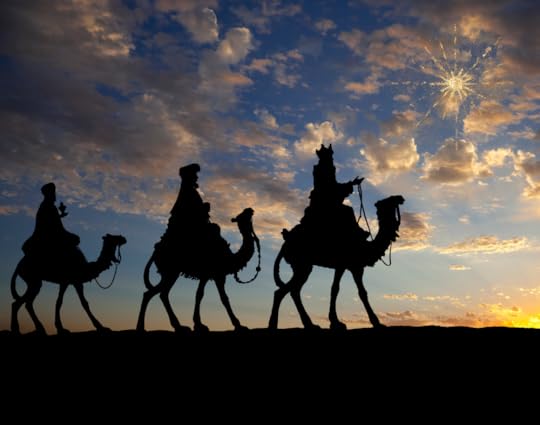
A number of sources claim these men were legendary rather than historical. If that were true, I don’t believe Matthew would have documented their story. More so than the other three gospel writers, Matthew strives to demonstrate that through his birth, life, teachings, death, and resurrection, Jesus was the fulfillment of the Old Testament Scriptures. A legendary tale would diminish the credibility of Matthew’s gospel.
So, what are we to believe?
Matthew begins the second chapter like this: “After Jesus was born in Bethlehem in Judea, during the time of King Herod, Magi from the east came to Jerusalem and asked, 'Where is the one who has been born king of the Jews? We saw his star when it rose and have come to worship him’” (Matthew 2:1-2).
The term Matthew uses for the wise men is Magi, which comes from a Greek word meaning “Persian priest or sorcerer.” This would indicate that the Magi were men of intelligence and power, but not kings. Because Persians worshiped a plethora of gods associated with the planets and constellations, their priests had to be experts in astronomy and astrology. That said, what did these wise men see in the sky that made them think a Jewish king had been born during a time of Roman rule?
The Persians were familiar with the Jews and their customs. After all, it was King Cyrus of Persia who put an end to the Jews captivity in Babylon and helped them rebuild the temple in Jerusalem. Therefore, it’s safe to assume that the Magi were also familiar with Old Testament readings.
There is a prophecy in the Book of Numbers that states, “A star will come out of Jacob; a scepter will rise out of Israel. He will crush the foreheads of Moab, the skulls of all the people of Sheth. Edom will be conquered; Seir, his enemy, will be conquered, but Israel will grow strong” (24:17-18). Given their fascination with the stars and planets, it’s likely the Persian priests had been looking for the fulfillment of this prophecy for centuries. “The sun has one kind of splendor, the moon another and the stars another; and star differs from star in splendor” (1 Corinthians15:41). We’ll never know for sure what the Magi saw, but something prompted them to pack up gifts of gold, frankincense, and myrrh and head west.
While the symbolic significance of these gifts is commonly understood to be gold for kingship, frankincense for worship, and myrrh for impending death, the intention may have been diplomatic in nature rather than spiritual. Gold, frankincense, and myrrh could just as easily be viewed as a peace offering to represent a nation’s wealth, spiritual strength, and medicinal wisdom. And there is reason to believe that Persia hoped the Jews might rise in power.
The Persians and the Jews shared a mutual disdain for the Romans, who continually waged war in their pursuit to control the entire Middle East. In contrast, relations between the Jews and Persians were positive. Many Jews who did not return to Jerusalem under King Cyrus remained in Persia where they continued to practice their religion without persecution. If a new king was going to rise up, surely Persia wanted to be on the winning side.
One would think, however, that these pagan Persians priests and their diplomatic journey don’t belong in a Jewish gospel, but Matthew carefully documents their encounter with King Herod. Why?
I think the answer lies in what the Magi tell Herod. “We have come to worship him.”
Before Jesus ever performed a miracle, wise men recognized him as the Messiah, the star of Jacob. Though the distance between Persia (modern-day Iran) and Bethlehem is more than 1000 miles, these wise men willingly made the long journey in the hopes of finding the prophesied king. And they didn’t come empty-handed. They brought gold, a rare commodity reserved for the elite. They brought frankincense, an expensive aromatic that took months to produce. And they brought myrrh, another labor-intensive resin that possessed medicinal qualities.
Over the years, the Magi have been given names, counted as three, and referred to as kings, but Matthew never claimed any of this. I believe the story as Matthew wrote it is true, but even if it’s not, it doesn’t matter. The message is clear: If you consider yourself to be wise, you’ll recognize Jesus as the Messiah, you’ll realize that he is worth seeking no matter how long it takes, and you’ll bring him the best of whatever you have to offer.
Merry Christmas!
THE SONG THAT COMES TO MIND is an oldie but goodie:
The Magi by Peter, Paul and Mary.
Favorite lyric: “Each man is a pilgrim. Yes, we all must make the journey.”
November 13, 2024
Unplanned and Unplugged
“Come to me, all you who are weary and burdened,
and I will give you rest.
Take my yoke upon you and learn from me,
for I am gentle and humble in heart,
and you will find rest for your souls.
For my yoke is easy and my burden is light.”
Matthew 11:28-30
My husband and I attended a churchwide retreat this past weekend, which was a first for me. I’ve gone on several women’s retreats and plenty of spiritual retreats—and even a few silent retreats—but never a churchwide retreat with people of all ages and stages. I assumed it would be like the others: guest speaker, tight agenda, required reading, and self-reflection homework.
I was wrong.
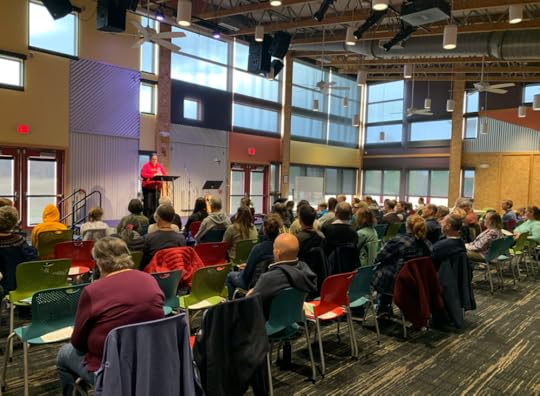
There was no guest speaker. Our head pastor officiated, but she didn’t preach or teach. Instead, she led us through a time of reflection that pointed us to rest. We were given a booklet that contained a loose agenda, designated mealtimes, and a lengthy list of optional activities. The booklet came in a welcome bag filled with crucial items, such as candy, pens, tissues, and gum. Reading was available for anyone who brought a book from home or wandered into the well-stocked retreat center library. And forget about homework! Though our booklet provided some introspective questions for those of us who desired some direction, answering them was not required or even encouraged.
How was this going to work???
In the first chapter of the Book of Mark, we read, “That evening after sunset, the people brought to Jesus all the sick and demon-possessed” (1:32). He heals them all, sending no one away. Then, “Very early in the morning, while it was still dark, Jesus got up, left the house and went off to a solitary place, where he prayed” (1:35).
Later in chapter 6, Jesus sends his disciples out in pairs to heal and cast out evil spirits. When they return and report all they were able to accomplish, Jesus says to them, “Come with me by yourselves to a quiet place and get some rest” (6:31).
When the work was complete, Jesus and his disciples rested. There was no agenda. No schedule. No guest speaker or homework. Just rest, which looks different for different people. That was what my churchwide retreat offered: an opportunity to find personal rest.
I don’t know about you, but I have a busy life. With so many things vying for my attention, I keep my cell phone close, and I stay on course by keeping a to-do list, a grocery list, a social calendar, and a media calendar. Unless I pencil in a time for play or reflection, it probably won’t happen. But it did this last weekend.
Far away from home, where cell phone connection was practically non-existent, I was able to find rest. I rest best in solitude while my husband rests best in fellowship with others. Both of us were satisfied.
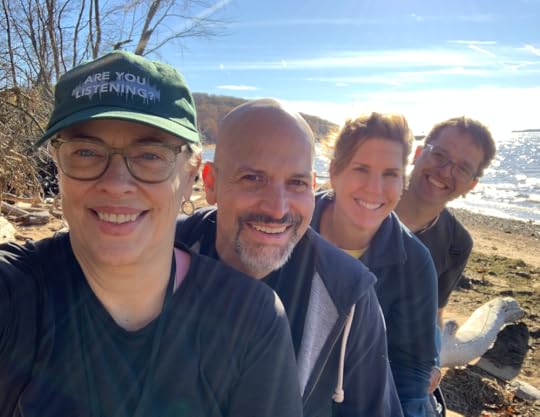
Each morning about 100 of us ate breakfast together that none of us had to prepare. Then we gathered to sing praise songs and hear a brief word from our pastor. After participating in lively, yet thoughtful discussions in small groups with people we had never met before, the day was ours to enjoy. Some people did the zipline, others the ropes course. There were plenty of walking trails to choose from through the woods or along the shore. Those who didn’t want to be outdoors went inside to play a game, paint a picture, read a book, or take a nap. After dinner, which we didn’t have to cook, there were bonfires and s’mores, karaoke, and games. But none of this was required—just available. Everyone moved at a pace that felt right to them.
God did not create us to work non-stop. He placed a sabbath day in every week to give our bodies, minds, and souls time to rest in and with him. Our chaotic world, which revolves around busyness and competition, tells us it’s normal to work on vacation, to carry on a conversation with one person while texting another, and to fill up free time with T.V. or video games. But God says, “Be still and know that I am God” (Psalm 46:10). “Better one handful with tranquility than two handfuls with toil and chasing after the wind” (Ecclesiastes 4:6).
Over 100 emails awaited my return, as well as more than 200 Instagram comments. But I didn’t freak out or become anxious. My attitude was calmer than usual because I felt well-rested. I plan to take my time getting through the work ahead of me by resting in gratitude and prayer more often. When I remember to include God in how I control each day, the tasks of each day lose their control over me.
I can say with conviction, my first churchwide retreat wasn’t well-planned, but it was sprinkled with God’s plan, and that made it the best plan of all.
THE SONG THAT COMES TO MIND is Rest by Kari Jobe.
Favorite lyric: “You’re closer than I thought was possible. So, I’ll rest right here with you.”
October 9, 2024
Of Kings and Presidents
Let everyone be subject to the governing authorities,
for there is no authority except that
which God has established.
The authorities that exist have been established by God.
Romans 13:1
The girls I knew in middle school adorned their bedroom walls with posters of Donny Osmond and Leif Garrett, but not me. I had two posters in my bedroom: one was a mosaic of Abraham Lincoln made up of small black and white photos from the Civil War, and the other was of Roseanne Roseannadanna (Gilda Radner) from Saturday Night Live.
I guess you could say I was into politics and humor, which may explain (1.) why I once worked as a radio news reporter/anchor and (2.) why I married Greg Rahal. (He makes me laugh every day.)
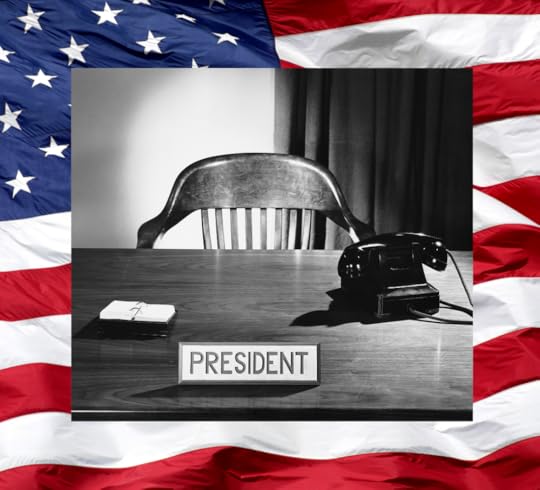
The landscape that shaped my political views looks nothing like today’s terrain. "Political debates" have morphed into "discord matches" where "opponents" rather than "candidates" elevate their "agendas" instead of their "abilities" to govern. What ever happened to humility, compassion, unity, and responsibility? Today’s political atmosphere reeks heavily of pride, malice, conflict, and blame.
I’ll be honest: I don’t have a lot of faith in either presidential candidate or in the wisdom of our congressional leaders to put the interest of the nation above their own personal desires. (I’m sure I ruffled a few feathers with that sentence, but I’m just speaking my truth.)
However, I can and do put my faith in Jesus in Christ to provide our country with leaders who will bring about his will, regardless of whether that corresponds with our will or not.
God chose Moses to lead his people out of Egypt, but Moses didn’t have their full support. In Exodus 6:6–7, God says to Moses, "Therefore, say to the Israelites: 'I am the Lord, and I will bring you out from under the yoke of the Egyptians. I will free you from being slaves to them, and I will redeem you with an outstretched arm and with mighty acts of judgment. I will take you as my own people, and I will be your God. Then you will know that I am the Lord your God, who brought you out from under the yoke of the Egyptians.'"
Verse 9 goes on to say, "Moses reported this to the Israelites, but they did not listen to him because of their discouragement and cruel bondage." The people needed Moses to lead them, but they didn’t know it. More importantly, their freedom was God's desire.
God’s view is so much bigger than our own. He sees what we do not and provides us with leaders who will fulfill a specific purpose.
God chose Saul as Israel’s first king because he was "an impressive young man without equal among the Israelites—a head taller than any of the others" (1 Samuel 9:2). Not only would he physically appeal to the people, but he would also accomplish the task God had in mind, which was to deliver God’s people from the hand of the Philistines. Saul was the best candidate for God’s plan.
Unfortunately, Saul’s pride eventually got the better of him, which forced God to choose another man to take his place. Samuel informed Saul of the change with these words: "You have not kept the command the Lord your God gave you; if you had, he would have established your kingdom over Israel for all time. But now your kingdom will not endure; the Lord has sought out a man after his own heart and appointed him ruler of his people, because you have not kept the Lord’s command" (1 Samuel 13:13–14).
As you know, David was the man after God’s own heart, and he ruled the nation of Israel for over thirty years. But after David and his son Solomon’s rule, a string of terrible kings took the throne. 1 and 2 Kings describes them as rulers who "did evil in the eyes of the Lord." Why would God allow this? Perhaps to teach the people a lesson.
Judah had become a nation of idols and false prophets under constant attack from neighboring nations and changing allegiances. Faced with disaster, God told the prophet Jeremiah to instruct the people to repent and reform their ways. When they did not listen, God handed them over to Nebuchadnezzar king of Babylon with this directive: "Build houses and settle down; plant gardens and eat what they produce. Marry and have sons and daughters; find wives for your sons and give your daughters in marriage ... Increase in number there; do not decrease" (Jeremiah 29:4–6).
It may seem like a strange command, but through submission and repentance, God would protect his people so they could thrive and become a strong nation again. God used the Israelite's enemy, Nebuchadnezzar, to both discipline and strengthen his people.
Here’s the point: Whatever your political affiliation, let us prepare to accept the outcome of the next election as God-ordained. "For dominion belongs to the Lord and he rules over the nations" (Psalm 22:28).
My personal prayer is for God to give us the president we need, one who fulfills a specific purpose that is good for his people and his kingdom. "I urge you, to pray for all people. Ask God to help them; intercede on their behalf, and give thanks for them. Pray this way for kings and all who are in authority so that we can live peaceful and quiet lives marked by godliness and dignity. This is good and pleases God our Savior, who wants everyone to be saved and to understand the truth" (1 Timothy 2:1–3).
And may we never forget that we are all under the authority of one supreme ruler who is the Alpha and Omega—the beginning and the end, the one who is and was and is to come. "To to us a son is given, and the government will be on his shoulders. And he will be called Wonderful Counselor, Mighty God, Everlasting Father, Prince of Peace. Of the greatness of his government and peace there will be no end" (Isaiah 9:6–7).
THE SONG THAT COMES TO MIND is King of the World by Natalie Grant.
Favorite lyric: “When did I forget that you’ve always been the King of the world?”
September 11, 2024
Memorials and Memories
Remember how fleeting is my life.
For what futility you have created all humanity!
Who can live and not see death,
or who can escape the power of the grave?
Psalm 89:47–48
When I realized that this blog would post on September 11, my mind jumped back to this day in 2001. I was living in a high-rise apartment building in Arlington, Virginia—less than five miles from the Pentagon. Like many of you, I was shocked and confused watching the tragedy unfold on T.V. When American Airlines flight 77 crashed into the Pentagon, I wondered if my life was in danger on the 17th floor.

I have visited the 9/11 Memorial Museum in New York City. I’ve wandered the banks of Normandy and wept at the American Cemetery and World War II Memorial in France. And I’ve toured the World Holocaust Remembrance Center in Jerusalem. They all left me feeling sad and vulnerable.
Memorials are erected to foster collective empathy, to remind people of their history, and to provide a space for the living to connect with the past. They are as relevant today as ever. When Joshua led the Israelites across the Jordan, God called for a memorial to be built. Joshua appointed 12 men—one from each tribe—to carry out God’s order.
“Go over before the ark of the Lord your God into the middle of the Jordan.
Each of you is to take up a stone on his shoulder, according to the number
of the tribes of the Israelites, to serve as a sign among you.
In the future, when your children ask you, What do these stones mean?’
tell them that the flow of the Jordan was cut off before the ark of the covenant
of the Lord. When it crossed the Jordan, the waters of the Jordan were cut off.
These stones are to be a memorial to the people of Israel forever.”
—Joshua 4:5-7
I don’t wish to be morbid, but memorials always remind me that life is unpredictable, that evil is real, and that humankind tends to choose war over peace.
On the world stage, Russia continues to bomb Ukraine. Most recently, the U.S. accused Iran of supplying Russia with short-range ballistic missiles, which Iran has denied. Since this war started in February of 2022, over 11,000 civilians and close to 70,000 Ukrainian troops have become casualties of war.
Last October, Hamas gunmen stormed across the Gaza border into Israel; they killed close to 1,200 people and took more than 250 hostages. Israel responded with air and military strikes that have left over 33,000 Palestinians dead. No end appears in sight.
The violence and destruction across the globe extends well beyond these two, well-publicized wars.
Haitian and Kenyan police continue to battle violent gangs and corrupt government officials in the poorest country in the Western hemisphere.
Approximately 14 million people are at risk of starvation and disease in Yemen due to a drawn-out civil war.
Under Taliban rule, living conditions in Afghanistan are ranked the worst in the world. Women are banned from work and education, and they are prohibited from going out in public without a male chaperone.
Damascus, the capital of Syria, has held the title of the world’s least livable city for eleven years due to instability of war. Approximately two-thirds of the population lives in poverty.
Though I could go on, I’ll stop here.
There is a vast world beyond our own front doors that is broken and hurting. We can turn a blind eye to the devastation and say that problems on the other side of the world don’t concern us—but they do—or, at least, they should.
Paul wrote in 1 Corinthians 12:24-26, “God has put the body together, giving greater honor to the parts that lacked it, so that there should be no division in the body, but that its parts should have equal concern for each other. If one part suffers, every part suffers with it; if one part is honored, every part rejoices with it.”
Paul was referring to Christian believers, but lest we forget, believers live all over the world—in countries that pride themselves on freedom of religion and in countries that attempt to control religious beliefs. Countries like Laos, Nigeria, Syria, Iraq, China, Iran, Turkey, Sudan, Somalia, North Korea, Pakistan, Eritrea, Libya, Afghanistan, Vietnam, Malaysia, Myanmar, Algeria, and Saudi Arabia. According to the Ethics and Religious Liberty Commission, “thirteen Christians a day were killed for their faith in 2023.”
Twenty-three years ago on this day, we Americans got a taste of what it feels like to be persecuted for our Christian beliefs. This is what many of our Christian brothers and sisters living in heathen countries experience daily.
It’s easy to overlook what is happening around the world when we are caught up in our own lives, distracted by work, focused on school, preoccupied with the upcoming presidential election, and zoned out on social media. But just because we don’t experience persecution firsthand does not mean we are excused from caring for those who do.
On this day, which serves as a tragic reminder of evil in the world, let us reflect on the words Jesus shared. “Love the Lord your God with all your heart and with all your soul and with all your mind. This is the first and greatest commandment. And the second is like it: Love your neighbor as yourself” (Matthew 22:37–39). Lest we forget, our enemies are also our neighbors, which is why Jesus also taught, “You have heard it said, ‘Love your neighbor and hate your enemy.’ But I tell you, love your enemies and pray for those who persecute you, that you may be children of your Father in heaven” (Matthew 5:43-45).
I encourage you to WATCH as you listen to the song I linked on YouTube below. Then set up a memorial in your hearts to remember and pray daily for those who suffer around the world. May we never forget. “Pray in the Spirit on all occasions with all kinds of prayers and requests. With this in mind, be alert and always keep on praying for all the Lord’s people” (Ephesians 6:18).
THE SONG THAT COMES TO MIND is People of the Cross by Selah.
Favorite lyric: “We are the people of the cross. We choose Christ and count all else as loss.”
August 14, 2024
Circumcision of the Heart
Circumcision has value if you observe the law,
but if you break the law, you have become
as though you had not been circumcised.
Romans 2:25
I’ve been thinking about circumcision lately—but only because the word keeps popping up in the Bible passages I’ve been reading. (No pun intended.)
The word “circumcision” appears in the Bible close to 100 times. The first is in chapter 17 of Genesis. "Then God said to Abraham, 'As for you, you must keep my covenant, you and your descendants after you for the generations to come. This is my covenant with you and your descendants after you, the covenant you are to keep: Every male among you shall be circumcised. You are to undergo circumcision, and it will be the sign of the covenant between me and you'” (Genesis 17:9–11).
I tend to quickly read through the passages of Scripture that deal with circumcision because, as a woman, they have nothing to do with me. Right?

Wrong.
We are all called to undergo circumcision regardless of our gender, age, or background. “For in him the whole fullness of deity dwells bodily, and you have been filled in him, who is the head of all rule and authority. In him also you were circumcised with a circumcision made without hands, by putting off the body of the flesh, by the circumcision of Christ, having been buried with him in baptism, in which you were also raised with him through faith in the powerful working of God, who raised him from the dead” (Colossians 2:9–12).
That is a mouthful, but it boils down to this: Faith that was once demonstrated through the physical ritual of male circumcision is now demonstrated by baptism into a spiritual relationship with Jesus Christ.
The physical act of circumcision found in the Old Testament may sound barbaric and strange to our 21st century ears when we consider that the procedure was performed with a flint knife on a man’s private parts without anesthetics, but it was actually a common practice in the ancient world. The Egyptians did it. The Polynesians and Aborigines did it. And the nations of Edom, Ammon, and Moab did it as well, according to Jeremiah 9:26. But the purpose was different.
Among these other nations, circumcision was commonly practiced on teens as a rite of passage from childhood into manhood. It was a visible mark of a man’s ability to procreate.
Within the Jewish community, however, circumcision was performed on every male child when they were eight days old. This was not a rite of passage but a sign of initiation into God’s kingdom. It wasn’t about manhood; it was about relationship. And that’s where things get messy.
Consider the story of the golden calf. Aaron and the Israelites constructed it to be their god while they were waiting in the desert for Moses to come down from the mountain where he was speaking with the Lord. When Moses finally descended with the 10 commandments in hand, he found the people praising what their hands had made. In anger, he smashed the stone tablets and rebuked the people. “Circumcise your hearts, therefore, and do not be stiff-necked any longer” (Deuteronomy 10:16). In other words, Moses wanted the Israelites to turn away from their stubborn desires of their own hearts and turn toward a relationship of loving obedience to God.
Our hearts are not the only parts of our bodies that need to turn toward God. Our voices, ears, and eyes must also be circumcised.
When God tapped Moses to be his mouthpiece before pharaoh, Moses questioned God’s decision, saying, “The people of Israel have not listened to me. How then shall Pharaoh listen to me, for I am of uncircumcised lips?” Here Moses claimed to be an unskilled speaker, someone whose speech would be found unacceptable by other men.
When the prophet Jeremiah spoke on God’s behalf, the people did not want to hear what he had to say. God’s call for repentance, fell on deaf ears. “To whom shall I speak and give warning that they may hear? Behold, their ears are uncircumcised; they cannot listen. Behold, the word of the Lord is to them an object of scorn; they take no pleasure in it” (Jeremiah 6:10). The people were not only unable to hear God’s voice—they had no desire to hear it!
A special relationship with God requires more than physical mutilation. True circumcision is marked by loving devotion to God—with every part of our being. As Paul wrote in Philippians 3:3, “For it is we who are the circumcision, who worship in the Spirit of God and boast in Christ Jesus and have no confidence in the flesh.” In simpler terms, faith is something we carry in ourselves, not on our bodies.
As a woman with no children of her own, I am neither an advocate nor proponent of physical circumcision. However, I am comfortable saying that through the death and resurrection of Jesus Christ, I have “circumcised the foreskin of my heart” (Jeremiah 4:4) and have, therefore, been “circumcised with a spiritual circumcision” (Colossians 2:11). I only pray that my words and actions reflect this.
THE SONG THAT COMES TO MIND is The Proof of Your Love by For King and Country
Favorite lyric: “Let my life be the proof, the proof of your love. Let my love look like you and what you’re made of.”
July 10, 2024
The Wonder of Nature
The whole earth is filled with awe at your wonders;
where morning dawns, where evening fades,
you call forth songs of joy.
Psalm 65:8

The promise of high temperatures in the 60s made Iceland the perfect summer vacation destination for this cold-blooded woman. My husband and his three best friends planned this couples trip a year earlier, and I was thrilled with their choice. What I was looking forward to the most was seeing puffins in their natural habitat. These small, tuxedo-feathered birds with their bright orange beaks and webbed feet congregate on the craggy cliffs of the Westman Islands, which is a series of 15 volcanic islands off the southern coast of Iceland. It is one of the largest breeding colonies in the world.
We arrived in this Nordic country on a dreary day and quickly made our way to the Blue Lagoon, a geothermal pool in the center of a dried lava field. Though the place was rather crowded, my body relaxed quickly in the warm, mineral-rich waters. I thought to myself, How thoughtful of God to place these hot thermal pools in this cold, dreary country.
Our next stop was our lodging along the Golden Circle. The hour-long drive revealed a pristine landscape unlike any I had ever seen. Mountain after mountain displayed the occasional waterfall, and glaciers appeared with cloud-covered peaks. There were endless fields of moss-covered rocks and purple Nootka Lupine. People were few, but there were thousands of sheep grazing in the open fields where steady sprays of steam casually ascended from the hot subterranean groundwater beneath.
What I did NOT see were powerlines, million-dollar homes, high-rise buildings, and fancy cars. And to be honest, I didn’t miss them. The slower pace of life where no one was trying to prove their worth was a welcomed reprieve from the noise and posturing of northern Virginia.
I came to learn that Icelanders value a healthy work-life balance that respects nature and the environment. In fact, this small country ranks number one in the world for income equality.
Instead of trying to fix the lay of the land for personal use and monetary gain, they embrace its natural state and strive to protect its raw beauty.
Which brings me back to the puffins. Over a million of these cartoonish birds nestle into the grasses and cliffs on the Westman Islands each summer to lay their eggs and nurture their young. After a 45-minute ferry ride on the Atlantic Ocean, we arrived in Heimaey Island— the only inhabited island of the Westmans. To view of the puffins, we headed up the windy east coast of this steep isle.
Puffins live most of their life on the Atlantic Ocean and only come on land during mating season. To get there, they must ride a big wave and flap their little wings like crazy to catch a wind current that will carry them to the cliffs. Puffins live for about 20 years and attach themselves to a mate for life.
The female lays just one egg a year, which she places in a burrow she dug with her own webbed feet. Both parents incubate the egg over a 40-day period. After the chick hatches, mom and dad take turns feeding the puffling while its adult feathers develop. When it’s time for the puffling to fledge (leave the home), the parents stop feeding it and head out to the ocean for the rest of the year. (I know a lot of parents who should consider trying this with their own adult children!)
Here’s where it gets tricky. Atlantic puffins are not the best flyers, and baby puffins are vulnerable to predators, such as the Great Black-Backed Gull that can catch a puffin in flight. Somehow the pufflings know about this danger, so they leave their burrow at night to avoid getting caught. God designed them to instinctively fly towards the moonlight that bounces off the ocean. In recent years, however, the town lights have confused the birds. Instead of flying out to sea, they fly into Heimaey where concerned citizens find them on the streets, pick up the birds, and head up the mountain to throw them off the cliff. (You can read more about it here.)
We humans are a lot like the puffins that fly toward the light. Sure, the moonlight looks beautiful, but the city lights are brighter, and they call us to desire something bigger, something better. But things are not always as they seem. That’s why God calls us to "…fix our eyes not on what is seen, but on what is unseen, since what is seen is temporary, but what is unseen is eternal” (2 Corinthians 4:18).
No one would ever accuse me of being a tree-hugger, but Iceland gave me a new appreciation for the wonders God designed in nature. I stand in awe of all God created and of what the natural world can teach us when we take the time to slow down and observe. "How many are your works, Lord! In wisdom you made them all; the earth is full of your creatures. There is the sea, vast and spacious, teeming with creatures beyond number—living things both large and small” (Psalm 104:25).
THE SONG THAT COMES TO MIND is So Will I by Benjamin Hastings and Hillsong United
Favorite lyric: “All nature and science follow the sound of Your voice.”
June 12, 2024
College Regrets and Celebrations
“Though your sins are like scarlet,
they shall be as white as snow;
though they are red as crimson,
they shall be like wool.
If you are willing and obedient,
you will eat the good things of the land;
but if you resist and rebel,
you will be devoured by the sword.”
For the mouth of the Lord has spoken.
Isaiah 1:18-20
On the way to my niece’s high school graduation, I struggled to recall any of my own commencement memories. I’m sure I walked a stage and shook someone’s hand, but I don’t remember where or whose. If there is a cap and tassel anywhere in this house, it’s probably covered in dust alongside my high school diploma.

High school was not a highlight for me, and the memories I do have are not all that memorable. Not only did I fail to form strong friendships, but I also didn’t have strong adult mentors to guide me. So, I headed off to college without a clear sense of what I wanted to achieve or what might be expected of me as a college student.
When I look back at my younger self, I have plenty of regrets. Some are due to my own bad choices, but many are a result of circumstances I was ill-equipped to handle. The rules I learned in my parents’ home did not apply in my college dorm. For example, both of my roommates smoked, which I did not appreciate but learned to tolerate. Sometimes boys slept over. Everyone said it was acceptable, so who was I to argue? The legal drinking age was 18 at the time, so every dorm room was well stocked, which often made getting to class on time difficult.
As an impressionable teen who wanted to fit in but lacked worldly knowledge, I chose to follow the crowd. Blending in seemed wiser than standing out. If I had known then what I know now, I hope I would have made different choices.
In the book of Nehemiah, we read that the Jewish people who had been exiled to Babylon seventy years prior return to rebuild the demolished wall surrounding Jerusalem. When the work was completed, they gathered to hear Ezra, the scribe and priest, read from the Book of the Law of Moses. “He read it aloud from daybreak till noon … and all the people listened attentively …” (Nehemiah 8:3).
We refer to The Book of the Law of Moses as the Torah or Pentateuch, which consist of the first five books of the Bible: Genesis, Exodus, Leviticus, Numbers, and Deuteronomy. Ezra reads these scrolls for roughly six hours straight while the people listen carefully. Scripture tells us they are so moved by what they hear that respond by weeping. What brought them to tears?
Awareness of their sin.
Years earlier, before Jerusalem was destroyed, the Lord’s prophets warned the people, “Turn now, each of you, from your evil ways and your evil practices, and you can stay in the land the Lord gave to you and your ancestors for ever and ever. Do not follow other gods to serve and worship them; do not arouse my anger with what your hands have made. Then I will not harm you” (Jeremiah 25:4-6).
But the people did not listen. Babylon sacked Jerusalem and carried all the rich, powerful, and artistic Israelites into captivity for seventy years. The people left behind were the poor—farmers and shepherds. Both groups came together to repair the wall and hear the word of the Lord. When they heard Ezra read, they cried for all they had lost because they chose to follow false gods.
When I started reading the Bible, I too was often moved to tears for the same reason as the Israelites: Awareness of my own sin. “Do you not know that your bodies are temples of the Holy Spirit, who is in you, whom you have received from God? You are not your own; you were bought at a price. Therefore, honor God with your bodies” (1 Corinthians 6:19-20).
Aristotle believed that crying in response to pain, disappointment, or grief could purify the mind. I believe righteous tears also purify the soul. Tears of true repentance have the power to wash our souls clean and reveal the clear path forward. “This day is sacred to our Lord. Do not grieve, for the joy of the Lord is your strength” (Nehemiah 8:10). God does not ask us to wallow in our mistakes; he asks us to repent, turn from our wicked ways, and celebrate our redemption.
I sometimes wish I could go back in time and relive the college experience differently, tapping into the knowledge and faith I have today. But then I remind myself that Jesus doesn’t require us to go back and clean up our mess. He did it for us. “God demonstrates his own love for us in this: While we were still sinners, Christ died for us” (Romans 5:8). Now that is truly something to celebrate!
THE SONG THAT COMES TO MIND is Let the Redeemed by Josh Baldwin
Favorite lyric: “There is joy in the morning springing up in my soul. There is life worth living ‘cause He calls me his own.”
May 8, 2024
Mother's Day Envy
Love is patient, love is kind.
It does not envy, it does not boast, it is not proud.
1 Corinthians 13:4
Every Monday night, the men at my church meet for weekly Bible study in our fellowship hall. Pizza and popcorn are always available, and several times a year they pull out all the stops and provide a steak dinner with a famous (or semi-famous) speaker. From what I hear, it’s always a great evening of fellowship and learning. I can’t attest to the validity of this statement, however, because my gender prohibits me from attending their meetings and engaging in the experience. I am only an outsider looking in with envy.
As a woman who was not able to bear children, this is also how I tend to feel on Mother’s Day. Envious.

Like Rachel who reportedly watched with envy as her older sister Leah carried and delivered four sons to their shared husband, Jacob, I have watched with envy as my friends bore children, raised them from infancy to high school, and sent them off to college. I am now at that stage of life where most of the invitations I receive from my peers are either for their child’s college graduation, wedding, or baby shower—all reminders of what I have missed.
I bear no ill will toward my friends or their children for celebrating these milestones. On the contrary, I rejoice in being included in their lives and celebrations. But I would be lying if I didn’t admit that at times my heart yearns for what I do not have, and envy creeps in like mold. “A heart at peace gives life to the body, but envy rots the bones” (Proverbs 14:30).
In ancient cultures, a childless wife was an embarrassment to her husband and a failure to herself. Though that is no longer the stigma associated with infertility today, the inability to bear children still has a way of making a woman feel inadequate, less than whole. I know. The words of Solomon echo what many women believe. “Children are a heritage from the Lord, offspring a reward from him. Like arrows in the hands of a warrior are children born in one’s youth. Blessed is the man whose quiver is full of them” (Psalm 127:3-5). There’s no question that Solomon was talking about himself. With 700 wives, his quiver must have been overflowing!
But for every verse about the blessing of children, there is a story of infertility. When matriarchs Sarah and Rachel were unable to bear offspring, they both encouraged their husbands, Abraham and Jacob, to sleep with their maidservants. The men did as their wives instructed to produce sons, but in the end, both wives conceived their own children as well.
Then there was Hannah, the mother of the prophet Samuel, and Samson’s mother, whose name is unknown. Unlike Sarah and Rachel who took matters into their own hands, these two barren women prayed to conceive children. God graciously answered each of their prayers and gave them both sons whose names live on in the Bible.
In the book of Ruth, we read that Naomi’s two sons marry Moabite women who produce no children during their ten years of marriage prior to their deaths. (Granted, Ruth goes on to marry Boaz, and they give birth to Obed who will one day be the grandfather of King David.) And speaking of King David, his wife Michal never produced an heir either. “And Michal daughter of Saul had no children to the day of her death” (2 Samuel 6:23).
I take comfort from these stories—not because suffering loves company, but because in them, I see myself. I can’t help but thank God for these and woman and their struggles. These stories echo down through the generations to inform me that infertility is not a curse. It is more like a birth trait given to us by our creator—more like blue eyes or a quick wit. “For you formed my inward parts; you knitted me together in my mother's womb” (Psalm 139:13).
And God will not allow my infertility to be wasted. Without children of my own, He has provided me with time and treasures to advance his kingdom in other ways. I have had the precious honor of counseling women through infertility, praying women toward pregnancy, loving on my nieces and nephews, mentoring students at my church, and teaching children about the love of God. These are the stories that fill my heart with joy and bring me peace.
I could hide and focus on what I lack, but I have found that it is better to embrace how God designed me and use it to encourage others, just as God has encouraged me through the strong women in Scripture. “As a mother comforts her child, so I will comfort you” (Isaiah 66:13).
So, to all the mother’s out there: Happy Mother’s Day.
And to all the barren women: God sees and loves you, too.
THE SONG THAT COMES TO MIND is You Make Everything Beautiful by Rebecca St. James with For King and Country
Favorite lyric: “Grant me freedom to walk a new path, and let me feel Your love. In my weakness You can shine. In Your strength I can fly.”
April 10, 2024
Gray with Grace
The young glory in their strength,
and the old are honored for their gray hair.
Proverbs 20:29
“I love your hair!”
This is the compliment I receive most often these days. Though my hair does not define me, I accept this praise with pride knowing that not everyone can wear gray well.
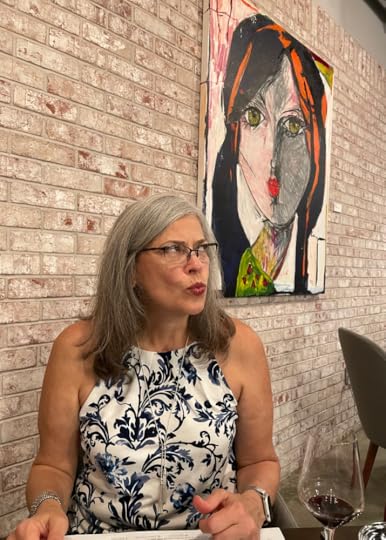
And yet …
Such a statement also serves as a reminder that I am no longer in the prime of life. In fact, I am closer to my death date than birth date, and that gives me pause.
Growing old is not for the weak. It takes stamina, fortitude, and a bit of spunk to gracefully accept the wrinkles, the age spots, and the gray hairs that appear where you least expect them years before their anticipated arrival. Thankfully, God allows the changes to emerge slowly, which undoubtedly prevents a plethora of early heart attacks. I’m not sure I would have survived my last birthday if I had looked in the mirror and found my grandmother staring back.
But a slow decline does have its setbacks. When a change in physical looks is gradual enough to go unnoticed, it gives the allusion that we are still as strong and sharp as we always were.
I was recently reading about a battle King David fought against the Philistines later in his life. 2 Samuel 21:15 states, “David went down with his men to fight against the Philistines, and he became exhausted.” (This is what can happen when you get older.) David was a warrior, but even warriors get old and tired. In this case, David had to be rescued by one of his mighty men who killed a Philistine to save David’s life. Afterwards, David’s men tell him, “Never again will you go out with us to battle, so that the lamp of Israel will not be extinguished” (21:17).
David’s men could have told him (but didn’t), “Never again will you go out with us to battle, because you are too old for that kind of thing.” Instead, they diplomatically told David that his life was too important to risk losing. I’m sure David saw right through their façade, but it appears he listened to their advice because subsequent verses give no indication that David ever participated in another battle.
I have to give this Israelite king credit for listening to his advisers. No one wants to be told that they are getting old and should stop participating in certain activities, even if they are dangerous. But David gracefully accepts his fate, unlike some other people I know.
Shortly after my father’s 80th birthday, we caught him on the roof, cleaning out the gutters. My siblings and I tried to be diplomatic by telling Dad that he had earned the right to have his gutters cleaned professionally. He would have none of it. Then we told him that we knew people who would do it for free. (That wasn’t entirely true. It would have cost someone something, but not him.) But still, Dad would not bite. Drastic times call for drastic measures.
“Dad,” I pleaded, “you are too old to be on the roof!” To which he responded, “No, I’m not.” End of story. It just goes to show that old age is not synonymous with wisdom.
I’ll be taking a different approach. Bring on the wrinkles, age spots, and gray hairs. I’ve earned them. No Botox or hair coloring for me. After all, if I want my life experiences to be accepted as sage advice, I need to look the part. I am not the beauty I once was according to human standards, but God isn’t looking at my waistline, crow’s feet, or gray hairs—he’s looking at what I’ve become. “Though outwardly we are wasting away, yet inwardly we are being renewed day by day” (2 Corinthians 4:16).
Eleanor Roosevelt—a woman not credited with good looks—wisely said, “Beautiful young people are accidents of nature, but beautiful old people are works of art.” God willing, I’ll be a masterpiece.
THIS SONG IS WORTH LISTENING TO! JUST CLICK THE TITLE.
THE SONG THAT COMES TO MIND is Growing Older by the JJ Heller.
Favorite lyric: “You’re growing older and more beautiful each day.”



